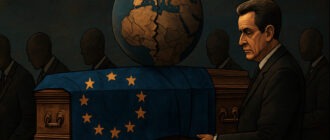The U.S. Congress has approved the release of documents related to the Jeffrey Epstein case.
This happened at a moment when American political reality is experiencing not merely a crisis of confidence in Donald Trump—whose approval rating has reached a historic low—or yet another surge of interest in the Epstein scandal, but the consequences of a prolonged erosion of democratic mechanisms and the growing power of the executive branch. To understand the scale of these changes, it is essential to explain several elements that are almost unknown to a post-Soviet reader but have enormous political significance in the United States.
The Katie Johnson Lawsuit
The story known as “the Katie Johnson lawsuit” is one such element. It is not tabloid gossip but a symptom of a deeper pathology affecting the American elite for decades. Under the name “Katie Johnson,” a civil lawsuit was filed in federal court in 2016: the plaintiff claimed that in 1994, when she was 13, she was sexually assaulted by Jeffrey Epstein and Donald Trump at one of Epstein’s residences. The lawsuit was later withdrawn, with Johnson stating she had received threats. In terms of the U.S. judicial system, the case never went to trial—but for the political process, the legal outcome matters far less than the mere existence of such a complaint, its connection to Epstein, and the fact that it concerns a sitting president. In the U.S., such stories never disappear completely; they become part of public memory, a tool of political struggle, and a potential basis for congressional investigations—any of which, under the right circumstances, can evolve into impeachment proceedings. Moreover, Johnson—who withdrew the lawsuit under threat—may re-emerge and testify before congressional and Senate committees.
The Nixon–Ford Power Transition as an Example of Impeachment Outcomes
If we imagine a scenario in which impeachment becomes likely, the logic of American politics dictates the next step automatically: power transitions to the vice president. This is precisely what happened in 1974 with Nixon and Ford—and Ford’s ascent to the presidency marked the moment when political power in the U.S. quietly shifted from charismatic politicians to a world of consulting corporations, private think tanks, and an administrative apparatus that operates more like a management structure than a political institution. The American state became corporatized—quietly, without coups or dramatic gestures, yet irreversibly.
The Hawks: J.D. Vance as a Potential New Gerald Ford
In today’s context, J.D. Vance could play a similar role—a figure who is not a dictator by temperament, but whose worldview and political environment could dramatically shift the balance of power. For a Russian-speaking audience, the phrase “Iraq War veteran” sounds neutral, almost mundane. In the U.S., it is a strong marker of ideological formation. Those who served in Iraq were shaped by an atmosphere of total militarization, by the “clash of civilizations” narrative promoted by the Bush administration as a quasi-religious crusade. Many served in Guantánamo, in counterterrorism units, in the Marine Corps—institutions where the operational reflex becomes “force plus suspicion.”
Today, the security bloc of the Republican administration is composed precisely of such figures:
Secretary of Defense Pete Hegseth, a veteran of Iraq;
ATF Director Daniel Driscoll, head of an agency known for its aggressive history (including the Reagan-era “War on Drugs,” which claimed no fewer lives than the narcotics crisis itself);
the Secretary of the Army;
and Secretary of State Marco Rubio—a politician with a sharply defined religious-nationalist ideology.
What unites them is not simply wartime experience, but a worldview in which the world is a battlefield of endless confrontation, compromise is weakness, and order is achievable only through force.
Is This a Turn Toward Military Rule?
Such a cabinet does not create a junta, but it does form a distinctive “security technocratic style” reminiscent of models familiar to post-Soviet readers: from Netanyahu-era Israel to Russia’s security-vertical. The U.S. system still preserves elections, separation of powers, and a free press—but beneath the surface, decision-making is increasingly concentrated in the hands of a narrow group with a militarized worldview. This is not a coup—it is a drift.
This drift is reinforced by external factors:
the escalation of the war in the Middle East and U.S. involvement in it;
the strategic setbacks in Ukraine, where Washington invested vast political capital;
the rise of the Democratic Party’s left wing, particularly visible in New York;
and deepening racial and cultural polarization.
All of this creates an environment in which a force-based approach becomes politically advantageous. Meanwhile, another front is developing: the push to control artificial intelligence. Here it is crucial to understand that the American debate on AI regulation is neither philosophy nor futurism. It is a debate about the management of information, access to data, and the ability to transform digital systems into tools of national security. A historical analogy is the Soviet OGAS project, where the military was envisioned as the overseer of a unified national information system, as the “least corruptible institution.”
In the U.S., the Pentagon, intelligence agencies, and the Department of Homeland Security could assume a similar role. If political power shifts toward Vance and the security bloc, AI regulation risks becoming part of a new Patriot Act—a mechanism that formally protects the nation but in practice expands the authority of the state and private corporations.
The Problem Is Not Trump but the Structural Erosion of Democracy
This is why the greatest danger to American democracy lies not in specific individuals—not in Trump, not in Vance—but in a power structure that increasingly rewards managed crisis and increasingly discourages democratic participation. This is a trajectory that begins with impeachment and ends not in dictatorship, but in a system where institutions exist without functioning; where elections occur, but policy is shaped by security technocrats, corporations, and the national security apparatus; where war and digital control become universal justifications for centralizing power.
Sadly, such a turn does not look like fantasy. It is the logical continuation of processes unfolding in the United States since the 1970s—processes that today converge at a single point.






